Food & Agriculture Features
The GLP explores the role of genetic engineering in food production and the polarized debate surrounding it. We highlight the work of our own writers, as well as that of contributors from around the Web. The GLP does not take a position on genetics-related issues; any opinions expressed belong to the authors.
Categories include:
- Chemicals and pesticides
- Organics
- Conventional crops
- New breeding technologies
- Animal biotechnology
- Food systems
- Sustainability
- Regulations
- Politics
- Ideology

IARC cancer agency mounts PR effort as probe of possible corruption grows
The agency was heavily criticized for the methodology used in declaring the herbicide glyphosate a "probable carcinogen." Now IARC is ...
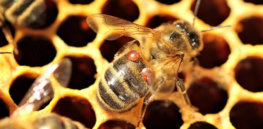
Tackling bees’ greatest threat: Lithium chloride could kill Varroa destructor mites without harming bees
A new study suggests that tiny doses of lithium chloride could be an easy and effective treatment for Varroa mites, ...

In Uganda, anti-GMO scare tactics even taint conventional hybrid crops
Uganda is moving closer to allowing cultivation of GMO crops. But there is considerable confusion among the Ugandan public over ...

We produce enough food on this planet to feed everyone: So why do we need GMOs?
A new "planetary boundaries" study says agriculture can be more sustainable to save the planet. Others say the numbers don't ...

Viewpoint: African farmers blocked from using life-saving GMO bananas by European activists
Anti-biotech groups funded by Western activists campaign against the commercialization of GMO crops in Africa, such as a new disease-resistant ...

Viewpoint: Misguided activism imperils potential of golden rice
Golden rice has the potential to solve a significant health problem in developing nations, where hundreds of thousands of children ...
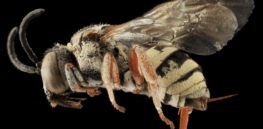
Rethinking the pesticides–neonicotinoids–bee health crisis narrative: Why the media get it wrong
Are bees endangered because of the use of insecticides, and in particular the class of chemicals known as neonicotinoids, which ...
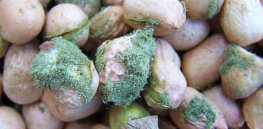
Can online gamers help developing nations solve aflatoxin crop contamination?
Puzzle solvers at the website Fold.it, a crowdsourcing project, are being asked to look for new and efficient ways to ...

Are seed patent protections abused by Monsanto and other agro-corporations?
Anti-GMO critics often claim major agricultural companies use seed patents to control farmers rights, which they say also limits innovation ...

Banning glyphosate: France may replace well-tested herbicide with pelargonic and other more toxic ‘natural’ chemicals
Activists say glyphosate can be replaced with natural herbicides—but "natural" doesn't necessarily mean that they're safer or better for the ...

Global glyphosate herbicide ban would cause substantial damage to economy and environment, study shows
A new study finds that a ban on glyphosate would cause billions of dollars in economic losses and increase the ...

Science communication 101: Being strategic isn’t unethical
Scientists interested in educating the public about controversial issues—such as GMOs—should focus on communication goals and strategies backed by social ...

US funding for cancer agency threatened over handling of controversial glyphosate report
US congressional committee members want to hear testimony from representatives of the International Agency for Research on Cancer regarding its ...

Calestous Juma: Africa needs its own Green Revolution based on science and technology
Africa can learn from the Green Revolution model—which saved up to one billion people from starvation—by bringing together government, academia, ...

To protect vineyards from pests and reduce pesticide use, CRISPR could be the answer
The powdery mildew fungus decimates vineyards around the globe. As pesticides become less effective, some scientists are turning to gene ...

Canola oil causes Alzheimer’s? How the media mis-covers science, feeds NGO misinformation and scares the public
Sensationalist press coverage fueled by a poorly written university press release misled the public about a recent study on mice—a ...

Viewpoint: If your interest is sustainability, organic and GMO labels won’t inform you
Focusing on tools and technologies—such as genetic engineering—can reduce agriculture's environmental footprint and promote sustainability, writes geneticist Maria Trainer ...

Double standard? Facing FOIA demand, California sides with anti-chemical professor, blocking email release
Why did the University of California reject a Freedom of Information request for an "anti-chemical" professor's emails, while handing over ...
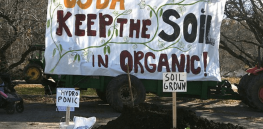
Organic movement schism? Fight over hydroponics puts $50 billion industry in limbo
The USDA's ruling that crops grown using hydroponics and aquaculture can be labeled organic set off a heated debate over ...

‘Big Ag’ may resonate with activists, but what does it really mean?
For some, GMOs are synonymous with 'Big Ag'? For others, 'Big Ag' means something entirely different. Does 'Big Ag' even ...

Viewpoint: Anti-GMO scare tactics show need for scientific literacy
Many of the arguments made by organic supporters and GMO critics aren't supported by science. That combination can have harmful ...

Viewpoint: 12 ways organic activists mislead consumers
Does the organic food industry use deceptive marketing practices to scare wealthy customers away from conventional agriculture and GMOs? The ...

How anti-biotech environmental groups are trying to kill roll-out of AquaBounty’s sustainable salmon
If you love Atlantic salmon, what you are eating is almost certainly farm-raised, despite what the label might say. The ...
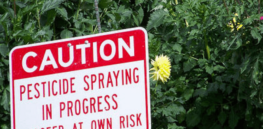
What foods have pesticide residues? When do the chemical traces pose dangers?
Dosage and length of exposure determines whether a compound actually produces toxic effects and could lead to such diseases as ...
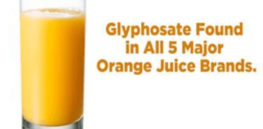
Viewpoint: Zen Honeycutt’s ‘inexcusable’ attack on orange growers betrays science
Activist group Moms Across America, run by someone with zero scientific training, makes a living attacking farmers and scientists that ...

Viewpoint: Anti-biotech groups’ master plan substitutes ‘citizen science’ for data in quest to get glyphosate banned
The European Union resisted the lobbying of organic and anti-biotech groups to renew authorization of glyphosate, although only for five ...

EU re-approval of glyphosate herbicide dodges farming economic woes—for now
If the European Union eventually phases out all the popular glyphosate herbicide, the loss of farm productivity could cost Europe ...

